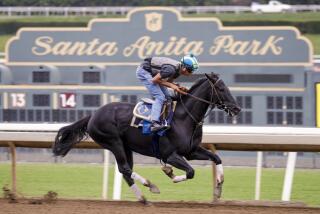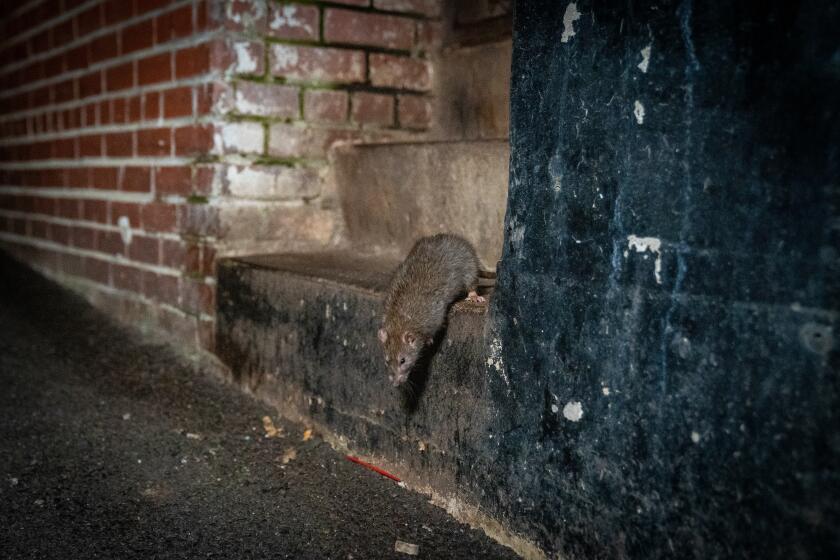Sidelined From Stable : Track Worker Fights Suspension Over Drug Tests
- Share via
Randeen Yozsa loves horses. And she treasured her job in the stables of Los Alamitos Race Course.
Last May, she lost that job when her veterinary assistant’s license was suspended after she refused to submit to a drug test ordered by state racing stewards.
Yozsa, 40, is fighting the suspension, and last month her case--a complicated tale of equines and amphetamines, test tubes and barns awash in rumor--made its way into the courts, carrying with it Yozsa’s career. Backed by her union, she filed complaints in federal and Orange County Superior courts charging that the stewards, in their zeal to stamp out drug abuse, had trampled her civil rights.
In some ways, Yozsa’s case is a product of the growing problem of drug abuse and the widespread attention it has received. But her story also lends insight into the ways non-judicial drug testing--required of an increasing number of employees in the United States--can become the basis of a disciplinary system in which hearsay and circumstantial evidence can end careers.
“Not Popular”
An irascible and, as she puts it, hyperactive woman, Yozsa concedes that she was not the most popular employee at the track. She had to fight a legal battle several years ago to establish seniority in her union, Hospital and Service Employees Local 399, but her fellow employees came to view her combativeness as an asset in labor relations and elected her their shop steward.
Working in the stables was her life’s goal.
“My love is horses,” she said, “and it’s the best way that I as a woman would be able to make a good salary without a college education. We make about $25,000 a year.”
She lost the job she had held for six years after a mare named Minnie Zanini won the seventh race at Los Alamitos on May 5, 1987, a 250-yard quarter horse run with a purse of $3,800.
Methamphetamine was found in Minnie Zanini’s urine in routine tests after the race. The specimen that led to that finding had been taken by Yozsa, and after a stewards’ inquiry she was declared to have been the source of the drugs found in it.
Yozsa’s attorney, Michael Posner, contends that the stewards’ inquiry was a “dog and pony show” convened as a pretext to rid themselves of a union activist.
Said Dick Davis, Local 399’s vice president: “We have something of a militant shop steward doing what the union would consider a good job down there representing the members. (Management) wants to try to get her out of their hair, and that’s what happened here.”
The stewards counter that drug abuse has become rampant in their industry and that strict measures are necessary against licensees whose conduct threatens the fragile integrity of the race track. They said they could not discuss the details of Yozsa’s case because of the litigation.
Seen as Deterrent
However, in their ruling of May 27, 1987, they wrote: “We may never know whether Minnie Zanini’s test was tampered with intentionally or accidently, but we feel that tampered with it was. Only a strong position of intolerance for the deed will discourage others from following a similar course.”
California’s race tracks are administered by state-appointed stewards, who convene separate boards to oversee the thoroughbred, quarter horse and harness-racing meets.
In early 1987 some boards were especially concerned with drug abuse. Harness-racing stewards at Los Alamitos in January required the drivers to take random drug tests, an order that was later struck down by a federal judge.
And later in the year, according to a transcript of the proceeding against Yozsa, the board overseeing Los Alamitos’ spring quarter horse races decided to take action against what steward George Slender called the “cloud” of drug abuse over the track’s receiving barn. Yozsa worked there, taking urine samples from horses after each race.
Testing Procedures
According to board investigator Ed Stetson, urine and blood samples are taken from the winning horse, the place horse and the losing horse that had been favored to win in each race. An outside laboratory tests the specimens to see if the horses might have owed their showing to any prohibited drugs.
If urine samples test positive, the blood specimens are analyzed to confirm the reading. Based on that, stewards can take action against trainers they believe have violated regulations.
Stetson said that in 1987, 23 horses statewide were found to have prohibited drugs in their systems. Of those, 22 were disqualified and lost their purses, with their trainers bearing the responsibility. In one instance, the trainer was exonerated and the blame was placed elsewhere, Stetson said. That was Yozsa’s case.
Steward Ingrid Fermin said her board was informed within days of the May 5 race that Minnie Zanini had tested positive. Curiously, the corresponding blood specimen showed no signs of methamphetamine, the testing facility, Truesdail Laboratories of Tustin, reported.
That reading, however, can no longer be verified. The blood sample was destroyed, according to the board’s lawyer, state Deputy Atty. Gen. John Crimmins. Crimmins said he was unsure why the sample was destroyed, and the chemist who conducted the test, David Hall, declined comment.
Trainer Exonerated
Fermin said that suspicion immediately fell on Minnie Zanini’s trainer, Charles Bloomquist, who had been cited three times for medication violations in recent years. But investigators raided his barn and turned up no drugs or other evidence of improper activity, she said.
So officials began to look elsewhere.
“We were hearing some kinds of rumors (about Yozsa and the staff’s alleged drug abuse) to start with,” Fermin said. “It’s our obligation to share that with our California Horse Racing Board investigators.”
The investigators moved quickly against their next target. On May 9, they came to Yozsa’s barn and announced they were conducting a shakedown.
“The whole situation was done without dignity,” Yozsa recalled. “They made us look like criminals, and they treated us like criminals.”
Investigators searched Yozsa’s clothing--down to her socks and shoes--and her pickup truck, she said.
No Drugs Found
An investigator then asked Yozsa, “What would you say if you got a report that this girl in the barn was selling and using drugs?” she said. “I knew it wasn’t me. But when they didn’t bring the rest of the girls out, I figured, ‘Hey, they mean me.’ ”
The search turned up no contraband and Yozsa did not appear to be under the influence of drugs, investigator Tony Pacheco later told the stewards at their hearing on Yozsa’s conduct.
But the investigators didn’t stop there.
“They demanded that I take a urine test within an hour or I would not be going back to work,” Yozsa recalled. “I said, ‘Sir, I will refuse the urine test.’ ”
Drug testing is not covered in her union contract or in racing board rules, she said. And, while it may be fine for horses, “your animal testing and your human testing are two different things.”
Others Undergo Tests
All the other workers at the barn consented to the tests. Two tested positive for marijuana, and one tested positive for methamphetamine. Those workers later were admonished by the stewards, but all were permitted to keep working.
The investigators immediately issued a complaint against Yozsa, charging her with refusing to submit a urine sample.
The stewards’ hearing on that complaint was May 12. Pacheco presented the investigators’ case, but Yozsa’s attorney Posner challenged the board’s right to require a urine test in the first place.
According to transcripts, steward Slender replied that “all I can say is that . . . by the mere fact that (Yozsa is) a licensee (she is) obligated to go along with the request.”
Two days later, investigators issued another complaint, which read that Yozsa “has been observed to be unlawfully engaged in the use of narcotics in the receiving barn, which by its nature is conduct detrimental to the best interests of horse racing.”
On May 19, Pacheco filed a third complaint, this one charging that Yozsa “did tamper with and adulterate urine sample No. 403 with methamphetamine.”
Possible Residue
Investigators theorized that Yozsa might have had some drug residue under her fingernails as a result of her presumed personal use and that the sample was thus contaminated when she collected it.
“They were trying to throw whatever kind of muck they could at (Yozsa) to justify the conclusion they had already reached,” Posner said.
Pacheco declined to discuss the investigation.
The hearing, which stretched over three days, was as much an inquiry into Yozsa’s personality as it was the circumstances of her alleged tampering and drug abuse.
The stewards said they found the testimony of Kathleen Vallandingham, a co-worker of Yozsa and a friend of Minnie Zanini’s trainer, Bloomquist, the most damning. An admitted drug user, Vallandingham said that she had kicked the habit just before the inquiry into Yozsa began.
Urged to ‘Come Clean’
Vallandingham testified that she had taken methamphetamine with Yozsa in a women’s restroom at the track. Vallandingham was the only witness to say she had seen Yozsa use drugs. When Posner questioned her motives at the hearing, Slender interrupted to defend her, the transcript shows.
The steward added that if Yozsa would “come clean, it’s going to work in her favor.”
Posner replied: “With all due respect, your comments are highly prejudicial. It certainly suggests that a judgment has been made and that we are going though a dog and pony show here.”
Posner submitted testimonials by Yozsa’s previous supervisor and other employees stating that she did not appear to be a drug abuser. And he argued that, “because an individual exercises her constitutional right and refuses to allow . . . an invasion of privacy (she should not) be associated with guilt in any way, manner or form.”
“If she would have agreed (to take the test), it would have given us more confidence in her,” steward Fermin said later.
The stewards ruled against Yozsa, saying she “needs to accept the responsibility.”
The ruling continued: “We have heard testimony of Yozsa’s ‘hyper’ behavior, overreaction to problems, weight-loss, unkempt appearance, unpredictable changes of mood, as well as an eyewitness report of her snorting ‘crank’ (metamphetamine). . . . We feel that this information gives us an abundance of evidence that substantiates her use.”
Keeping Racing Clean
The stewards grant that the evidence they used against Yozsa might not stand up in court. But they argue that theirs was not a criminal proceeding, and that their duty to keep racing clean justifies the waiving of some civil rights.
Posner said the stewards “are unsophisticated as far as due process or the legal process is concerned. Their retaliation against (Yozsa) was precipitated by their anger that she would have the audacity to refuse to take the test.”
Said Davis, the Local 399 vice president: “The union sees the need to keep racing clean. But we’re not going to stand idly by and see one of our shop stewards railroaded when it’s wrong.”
Yozsa, who testified that she had tried methamphetamine while a teen-ager in the 1960s but not since, spends her days now on her parents’ ranch in Riverside County.
Through her lawsuits, she is hoping one day to get her job back. She also is asking for several million dollars in damages.
“I’ve been a total outsider,” she says. “I never got a degree or anything, and the racing game is my life.
“But this makes you wonder about the right and wrong of things. It makes you question all the truths when the people in control can do that kind of thing to you.”
More to Read
Go beyond the scoreboard
Get the latest on L.A.'s teams in the daily Sports Report newsletter.
You may occasionally receive promotional content from the Los Angeles Times.










